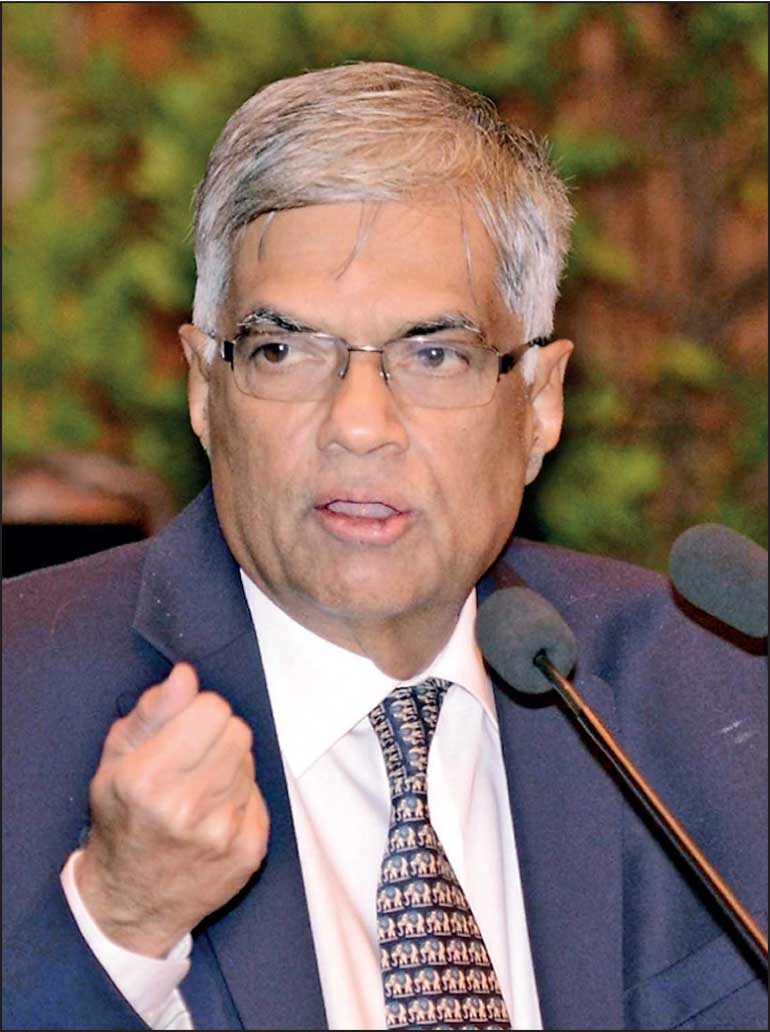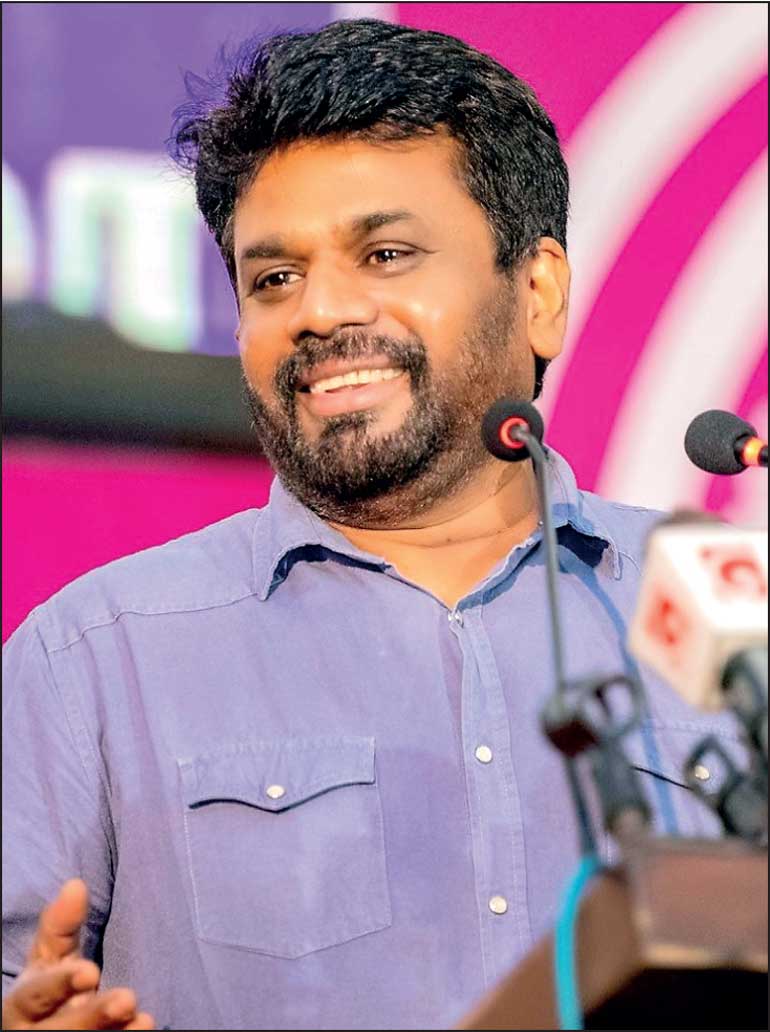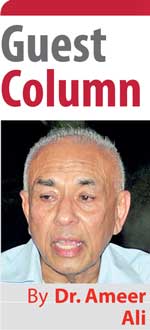Sunday Feb 15, 2026
Sunday Feb 15, 2026
Friday, 15 September 2023 00:20 - - {{hitsCtrl.values.hits}}

President Ranil Wickremesinghe

NPP/JVP Leader A.K. Dissanayake
 “The further a society drifts from the truth, the more it will hate those that speak it” (George Orwell)
“The further a society drifts from the truth, the more it will hate those that speak it” (George Orwell)While the economy is still struggling to steady itself, new and startling revelations about the Easter massacre, had appeared like a phoenix through a British TV channel, and caught many politicians on the hop. The timing of those revelations closer to the next session of UNHCR in Geneva may have prompted President RW to take some action. It has been reported that he would appoint a retired judge to probe into the matter soon after he returns from his trip to Cuba and US. This will be another timewasting exercise possibly ending in another committee of inquiry.
Already a Parliamentary Select Committee and a Presidential Commission of Inquiry had probed into the matter and still the masterminds behind that horror are yet to be brought to justice. The truth behind that infamy has remained elusive. The Catholic Archbishop of Colombo backed by Vatican had been relentless in calling for an independent inquiry by international investigators, and now the leader of the main opposition has joined him. Meanwhile the usual tactic of disparaging the TV channel and source of those revelations continue.
Be that as it may, IMF delegates are expected to arrive soon to audit the progress made since the first tranche was released. No doubt some progress had been made particularly in terms of financial stability. Except for the failure to hit the tax revenue mark of Rs. 4.2 trillion targeted by IMF for 2023, other economic indicators show a degree of improvement. Achieving monetary stability through prudent management of the country’s finance by CBSL should be credited and its effort to bring down headline inflation to around 5% or less through a deliberate policy of capital control should also be commended. But domestic prices still remain high dampening consumer spending.
On domestic debt restructuring the Inland Revenue Act has been amended by the Parliament to support CBSL’s DDO measures to bring in EPF, ETF and other superannuation funds to share the burden of debt reduction. Naturally this iniquitous step after exempting the banks has provoked strong opposition from the trade unions. Apart from that opposition, how successfully DDO would help negotiations over foreign debt restructuring is yet to be seen. On top of all this, the Government has decided to keep its maximum annual borrowing limit to Rs. 9 trillion, which together with foreign debt would amount to a total debt of a staggering $ 96 billion so far. Will Sri Lanka ever be debt free?
There are also other issues that would make economic revival slow and painful. For example, IMF’s and World Bank’s prognosis of a weakening global economy caused primarily by the war in Europe and climatic change is becoming increasingly worrisome because of a struggling Chinese economy. This downturn would mean a shrinking international trade sector. In that context, whether Sri Lanka like several other small open economies which are excessively debt burdened and desperately need to achieve trade surplus could ever emerge debt free is extremely doubtful. Besides, IMF’s stipulations to undertake structural reforms and end corruption have not proceeded beyond the discussion stage. On corruption, the recent defeat of a motion in Parliament to remove the health minister who was widely accused of corrupt behaviour shows how political brinkmanship is caging the president and preventing him to act in the interest of the public. However, there is talk of a mini cabinet reshuffle to get rid of this minister.
 In the meantime, foreign remittances and tourist income had helped to achieve a temporary surplus in BOP although the all-important balance of trade is in deficit. True, decades of systematic mismanagement cannot be corrected in just one or two years. But the IMF pathway without overthrowing the existing socio-political and economic paradigm will never liberate this nation from its poly-crisis. Still and in all probability, the delegates would recommend the release of the second tranche for other reasons. RW’s neo-liberal commitment to the free market economy, his willingness to reshape the country’s foreign policy and strategic alliances to suit the preferences of IMF shareholders, and therefore the need to assist him to continue as president after 2024 would play a significant role in that recommendation.
In the meantime, foreign remittances and tourist income had helped to achieve a temporary surplus in BOP although the all-important balance of trade is in deficit. True, decades of systematic mismanagement cannot be corrected in just one or two years. But the IMF pathway without overthrowing the existing socio-political and economic paradigm will never liberate this nation from its poly-crisis. Still and in all probability, the delegates would recommend the release of the second tranche for other reasons. RW’s neo-liberal commitment to the free market economy, his willingness to reshape the country’s foreign policy and strategic alliances to suit the preferences of IMF shareholders, and therefore the need to assist him to continue as president after 2024 would play a significant role in that recommendation.
However, while the economy is wriggling to get out of the crisis political parties are looking for winnable issues to win the forthcoming presidential race. Sinhala Buddhist ultranationalism once again is on the march looking for a political party or a coalition of parties to champion its cause at that election. A number of flashpoints have cropped up from Kurundoor in the north and Trincomalee in the east to the British TV revelations, which is alleged to be the handiwork of Tamil diaspora could be utilised to whip up anti-Tamil and anti-Muslim fervour to win the Sinhala Buddhist votes. The saffron army as usual has already warned diabolic consequences were RW’s reconciliation agenda be carried out. These developments would be a setback to economic revival.
In this communal politics, NPP/JVP seems to be an exception even though its opponents would keep on reminding the public of JVP’s communalist origins in the 1970s. That the majority of the current generation of JVP leadership and members were not even born in 1970s is conveniently forgotten in the anti-NPP/JVP propaganda. On the contrary, it is only this party that has an economic alternative to offer in place of the neoliberal free market model, and is also willing to change the current socio-political system structured on communalist architecture.
With a democratic constitution based on secular principles this party guarantees equal rights and obligations to every citizen irrespective of his or her religion, language or ethnicity. Meritocracy with accountability and independence of judiciary seem to be the pillars on which an NPP government hopes to rule. Its concept of a social market economy that would mean that the model will be market friendly and not market controlled. And more importantly, the NPP model would have a strong domestic focus to maximise the country’s internal strength and productivity in contrast to the open economy model which puts all its eggs in the export basket. This alternative is also different from the 1970s dogmatic import substitution industrialisation model of the Sirimavo Government which ended in total disaster. But will NPP be given a chance to govern on its own? It is going to be a tough but welcoming challenge.
(The writer is attached to Murdoch Business School, Murdoch University, Western Australia.)